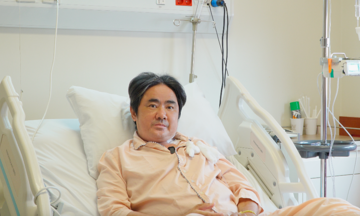Influenza A is an acute respiratory infection caused by common influenza A virus strains like H1N1 and H3N2, according to Dr. Nguyen Tien Dao, Medical Manager of VNVC Vaccination System. Flu symptoms include fever, body aches, coughing, and can lead to complications like pneumonia and respiratory failure. Dr. Dao highlights the following reasons why influenza A can be more severe and lead to pneumonia in older adults:
Difficulty expelling phlegm:
Dr. Dao explains that to combat the influenza A virus, the mucous membranes secrete more mucus to eliminate the virus. This leads to coughing and expectoration to clear the airways. However, fatigue, body aches, high fever, shortness of breath, loss of appetite, and difficulty sleeping caused by the flu can lead to exhaustion, reducing the ability to expel phlegm. This can block airways and create an environment for other viruses and bacteria to enter the lungs, causing pneumonia.
Furthermore, the damaged mucous membranes due to the flu can also pave the way for other pathogens to attack. Older adults often have underlying health conditions that weaken their immune and respiratory systems, such as asthma, chronic obstructive pulmonary disease, and diabetes. When they contract the flu, the illness tends to last longer and become more severe.
 |
A 90-year-old woman with influenza A and pneumonia complications, being treated at Tam Anh General Hospital in TP HCM, 15/8. Photo: Ha Vu |
A 90-year-old woman with influenza A and pneumonia complications, being treated at Tam Anh General Hospital in TP HCM, 15/8. Photo: Ha Vu
Self-treatment:
Many people believe that influenza A only causes coughing, fever, and a runny nose, so they often underestimate it and treat it with folk remedies or over-the-counter medications based on symptoms. However, many of these methods are not scientifically proven, and self-treatment can be incorrect.
For example, people tend to take antibiotics for sore throats and fever when they have the flu. In reality, antibiotics are not effective against the influenza virus and should only be used as prescribed. Misuse of antibiotics can cause side effects like diarrhea, fatigue, reduced resistance to infection, and bacterial superinfection. It can also allow the influenza virus to multiply and enter the lungs, especially in older adults with chronic underlying conditions.
A 58-year-old man from Tuyen Quang with a history of mild hypertension self-treated at home when he had influenza A with symptoms of coughing, fever, and shortness of breath. He subsequently developed respiratory failure and 80-90% diffuse lung damage, requiring treatment at the National Hospital for Tropical Diseases in February.
Unhealthy lifestyle habits:
Many people believe that when they have the flu, they should avoid bathing, brushing their teeth, gargling, or eating certain foods like chicken, seafood, shrimp, and bananas. Additionally, many adults continue to work, leading to insufficient rest.
According to Dr. Dao, these habits can worsen the flu and increase the risk of pneumonia complications. Influenza causes high fever and excessive sweating and phlegm production. Poor hygiene can lead to secondary infections. Restrictive diets, overwork, and insufficient rest can weaken the immune system, exacerbating the illness.
Flu prevention:
According to Dr. Dao, the influenza A virus spreads easily through respiratory droplets produced when an infected person coughs or sneezes. The virus can also survive on surfaces for up to 48 hours, infecting people who touch contaminated surfaces and then touch their eyes, nose, or mouth.
The risk of transmission is higher in enclosed spaces like schools, hospitals, offices, and dormitories. Young children, pregnant women, adults over 65, and people with chronic illnesses are at the highest risk of developing severe complications.
 |
Older adults receive flu vaccines at VNVC Vaccination System. Photo: Dieu Thuan |
Older adults receive flu vaccines at VNVC Vaccination System. Photo: Dieu Thuan
The Ministry of Health recommends annual flu vaccination to prevent influenza A. The vaccine protects against four common flu strains, including A/H3N2, A/H1N1, and two influenza B strains.
According to the World Health Organization (WHO), vaccination can reduce flu-related illnesses by up to 60%, hospitalizations by 90%, and deaths by about 70-80%, especially in groups with weakened immune systems, underlying medical conditions, and chronic obstructive pulmonary disease (COPD).
Four types of influenza vaccines are currently available in Vietnam. The vaccines from France, the Netherlands, and South Korea are for children 6 months and older and adults. The Vietnamese vaccine is for people aged 18 to 60. Children aged 6 months to under 9 years who have never received a flu vaccine need two doses, at least one month apart. People 9 years and older only need one dose. An annual booster shot is recommended. Pregnant women can receive the flu vaccine at any stage of pregnancy, preferably from the fourth month onwards, to protect their health and provide passive immunity to their babies.
In addition to vaccination, people should also prevent influenza A by frequently washing their hands with alcohol-based hand sanitizer or soap after touching objects or being in public places, limiting contact with people suspected of having the flu, and avoiding crowded places during flu season. Disinfect living and working spaces and ensure good ventilation. Boosting the immune system through regular exercise, a healthy diet, and adequate rest is also crucial.
If you have the flu, drink plenty of fluids, eat nutritious foods, and opt for easy-to-swallow foods like porridge, soup, and fruit smoothies if you have a loss of appetite. Supplement with vitamins. Maintain personal hygiene, brush your teeth gently, and gargle with saline solution daily to clear the throat and eliminate the flu virus. When bathing, do so in a closed room, avoid drafts, and avoid long or cold showers.
Linh Dan












